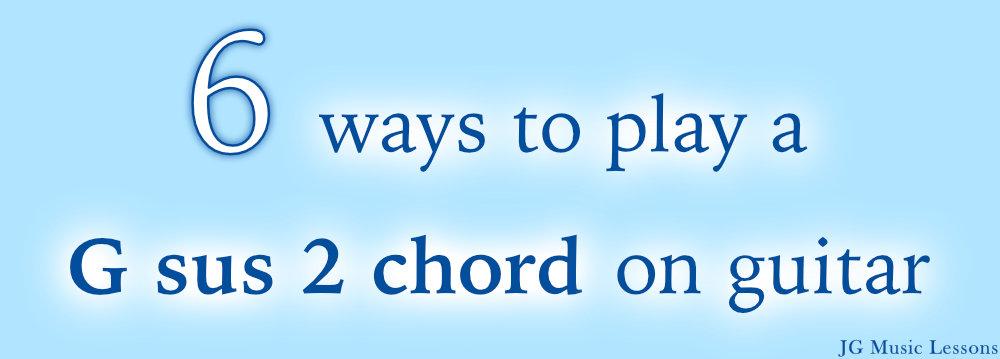After mastering your basic chords on guitar, you’ll also want to learn sus 2 chords which often come up in many popular songs. These chords have a cool, airy, open sound that will freshen up progressions. In this lesson, we’ll specifically be covering how to play the G sus 2 chord, which is short for “Suspended 2”.
This chord has an easy open shape but there are many different ways you can play it throughout the guitar fretboard. By knowing different chord variations, you’ll be able to use them in different musical contexts.
We’ll first go over some basic chord theory and then show you G ways to play a G sus 2 chord on guitar. Let’s get started!
G sus 2 chord theory
“Suspended 2” chord means that the 2nd degree replaces the 3rd of the chord. For example, a Major triad chord has the chord tones 1, 3, and 5, but a sus 2 chord has chord tones 1, 2, and 5.
This means that a G sus 2 chord has the chord tones G, A, and D.
Here is the formula for sus 2 chords below.
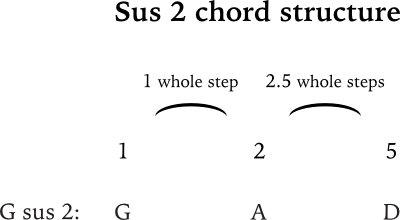
To compare, here are the notes for other chords with G as the root.
- G Major chord has the notes G, B, and D.
- G minor chord has the notes G, Bb, and D.
If needed, check out this other post to understand the difference between sus 2 chords and add 2 chords.
Now that you know what notes belong to the chord structure, let’s look at how to read the chord charts.
How to read the chord charts
For the charts below:
- The top horizontal line of the chord chart represents the high E string and the bottom horizontal line represents the low E string.
- The vertical lines separate each fret.
- The numbers in the blue dots tell you which fingers to use on the fretting hand.
- The letters on the right of the charts tell you what notes you are playing on each string.
- Circles on the left represent open strings.
- Red X means to avoid that string.
You can check this link for more on how to read guitar notation symbols.
G sus 2 chord – open shape
For the first way to play a G sus 2 chord, I recommend learning the following shape similar to an open G chord. The only difference is that you use your first finger to play the 3rd string, 2nd fret like this:
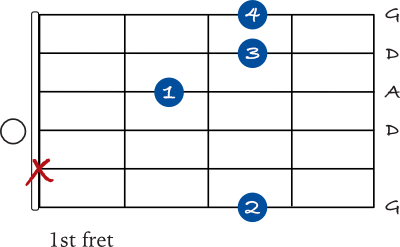
G sus 2 barre chord on the 5th string
You can also play the G sus 2 chord using a barre on the 5th string. This shape comes from shifting the open A sus 2 chord. You would barre the 10th fret and add the notes on 12th fret (3rd and 4th strings). This shape looks like a power chord, except you are also barring with your first finger.
If you can’t get the chord to sound clear, first try to get the notes from the 5th to the 2nd fret. As you develop more strength in your fingers, try adding the 1st string as well.
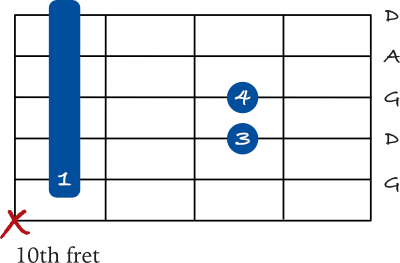
If needed, you can check out these 5 tips to get better at playing barre chords.
G sus 2 chord on the 4th string
Another way to play this chord is by using a mini barre starting on the 4th string. This chord originally comes from the open D sus 2 chord shape but we use the 1st finger to barre and shift the chord.
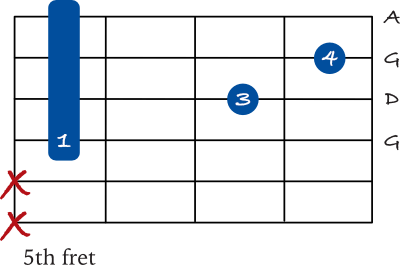
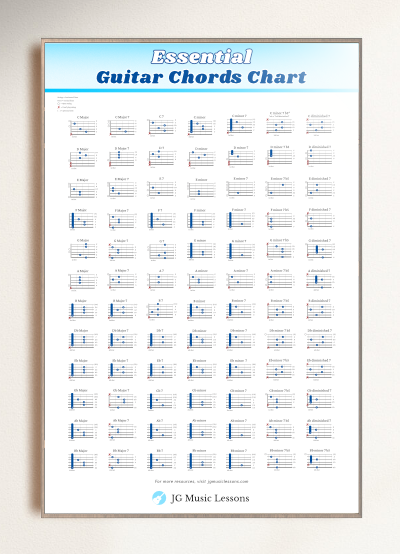
G sus 2 chord on the 6th string
The following chord shape is trickier to play because of the wide stretch between your fingers. This variation would be more suitable for a rock style because of the way the notes are arranged in the lower strings.
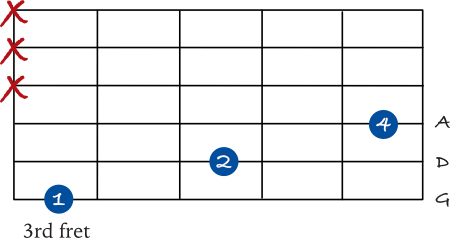
You can also use this same shape starting on the 5th string, 10th fret while avoiding the strings that are not fretted.
G sus 2 chord – 5th string variation
The following chord variation is less common but also a good addition to your tool belt. The distance between the notes in the 5th and 4th string creates a unique cluster sound.
This chord originally comes from the open C sus 2 chord shape but we use the 1st finger to barre and shift the chord.
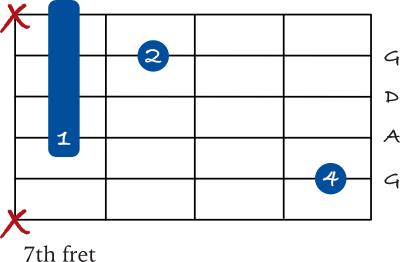
G sus 2 chord – 2nd inversion
For the last G sus 2 chord, we’re using another variation starting on the 5th string using a 2nd inversion. This means that 5th of the chord is in the bass note (D in this case).
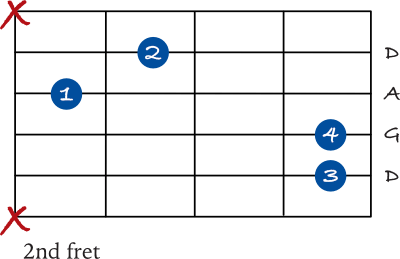
This shape originally comes from the open F sus 2 chord in 2nd inversion, starting on the 5th string.
Wrapping up
Sus 2 chords sound great as replacements or embellishment for Major chords to create an open sound. Try replacing these chords to add a little twist to chord progressions you already know. Experiment to get a feel for how these chords work best.
It’s good to know different variations of playing sus 2 chords because you have more flexibility to move around the fretboard and also when you need a specific note in the top to help define a melody that you are playing over.
I hope this helped you understand how to play a G sus 2 guitar chord or learn new ways of playing it. You can also try shifting the shapes that have all fretted notes to play other sus 2 chords on the same string.
📘 Get the free guitar practice guide here!
All the best,
JG Music Lessons
📙 Kickstart your guitar playing with our step by step guide: Guitar Essentials.
🎸 Looking for a travel or half-sized guitar? See this one.
🛠 See our other music recommendations.
🤝 Support the site to help us to create better content for you!
Level up with the FREE guitar practice guide and effectively improve your playing! 🎸
Get it sent to your email!

